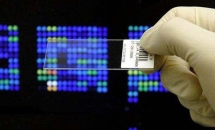The identification of what are known as cancer genes (oncogenes and tumour suppressor genes) led to the characterisation of cancer as a genetic disease of the tumour cells. When it was discovered that the same genes that are altered in the tumour cell could be the ones responsible for syndromes of a hereditary predisposition to cancer, a small revolution took place in the treatment of hereditary cancer. Nowadays, the following challenges exist in this field: improving and optimising the diagnostic algorithms by incorporating the latest methodologies; individualising risk by learning to interpret the biological and clinical significance of identified genetic variants and their interaction with the environment and habits of the carriers; identifying new genes and risk alleles that can help to explain the causes of most of the family aggregation observed (still unexplained); and communicating risk by improving the process of genetic consensus. In the lecture, the speaker will use specific examples to illustrate the progress that is being made in all these aspects.
Cycle: Challenges of the 21St Century the Voice of Medicine, II
Organized by: Residence for Researchers, Fundació Clínic Barcelona, IDIBAPS and RESA
